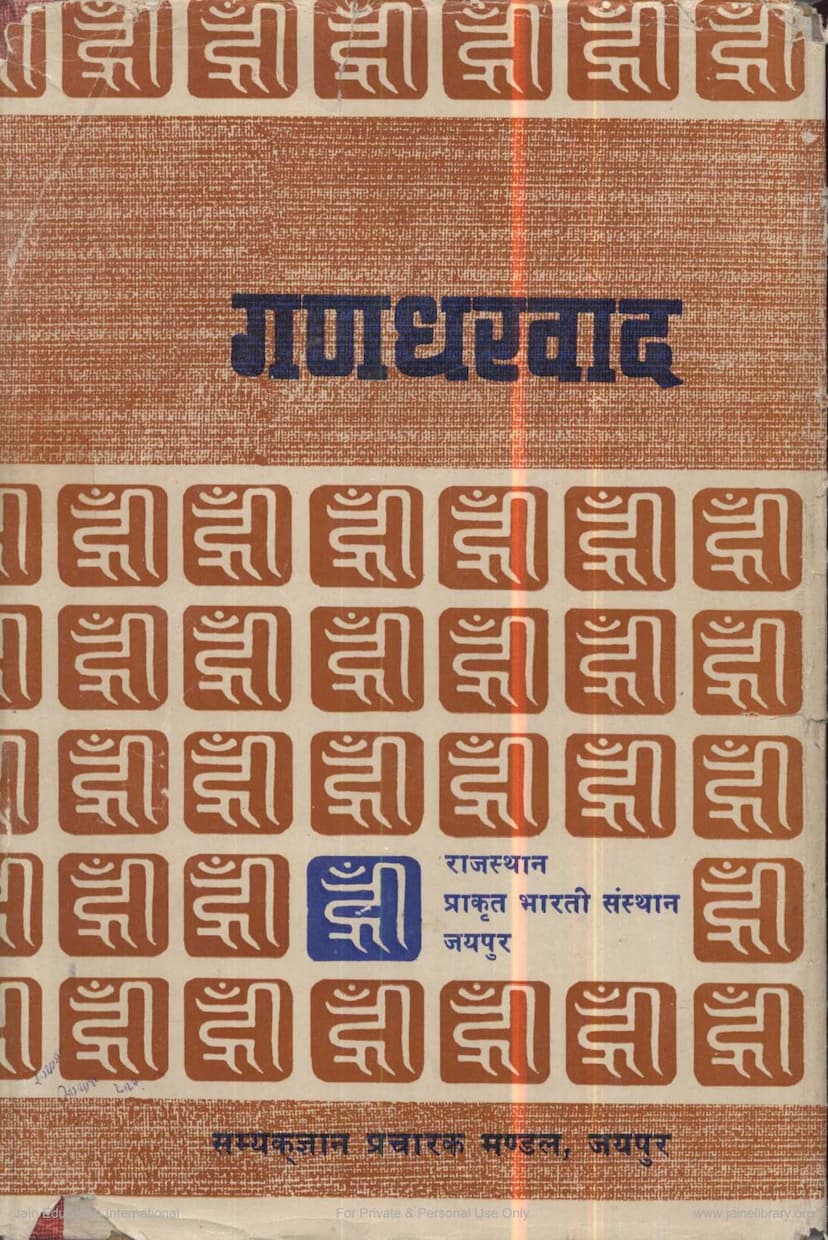Gandharwad
Added to library: September 1, 2025

Summary
Here's a comprehensive summary of the Jain text "Gandharwad," based on the provided pages:
Book Title: Gandharwad (गणधरवाद) Author: Acharya Jinbhadragani Kshamaashraman (आचार्य जिनभद्र गरिण क्षमाश्रमण) Publisher: Rajasthan Prakrit Bharti Sansthan Jaipur (राजस्थान प्राकृत भारती संस्थान जयपुर) and Samyagyan Pracharak Mandal, Jaipur (सम्यग्ज्ञान प्रचारक मंडल, जयपुर) Original Language: The text is originally part of the "Visheshavakash Mahabhashya" (विशेषावश्यक महाभाष्य) by Acharya Jinbhadragani Kshamaashraman. The provided publication is a Hindi translation of the "Gandharwad" section, originally translated from Gujarati into Hindi.
Key Aspects and Summary:
-
The "Gandharwad" as a Chapter: The "Gandharwad" is a significant chapter or section within Acharya Jinbhadragani Kshamaashraman's monumental philosophical work, the "Visheshavakash Mahabhashya." This Mahabhashya is a profound philosophical treatise that delves into various fundamental questions of Jain philosophy.
-
Core Philosophical Analysis: The "Gandharwad" specifically focuses on analyzing and establishing the existence of key philosophical concepts. These include:
- The existence of the soul (Jiva).
- The theory of Karma (Karmavaad).
- The non-difference of soul and body (Jiva-sharir abhinnavaad).
- The theory of five elements (Panch Bhutavaad).
- The existence of past lives and rebirth (Purvajanma Punarjanma ka astitva).
- The existence of merit and demerit (Punya-Paap ka astitva).
- The existence of celestial beings (Deva) and hellish beings (Naraka).
- The existence of bondage (Bandha) and liberation (Moksha).
-
Methodology and Context: A notable feature of Acharya Jinbhadragani's analysis is its presentation within the context of Vedic ideology. He systematically refutes opposing viewpoints, particularly those from Vedic traditions, and logically establishes the validity of Jain doctrines.
-
Dialogue with Ganadharas: The "Gandharwad" is structured as a discourse and debate between Bhagavan Mahavir and his eleven chief disciples, the Ganadharas. These Ganadharas were former scholars and masters of Vedic knowledge and rituals. Acharya Jinbhadragani portrays these intellectual exchanges, where the Ganadharas presented their doubts and arguments (often rooted in Vedic concepts), and Bhagavan Mahavir systematically resolved their queries, leading them to their ultimate understanding and discipleship.
-
The Eleven Ganadharas: The text highlights the eleven primary Ganadharas who were instrumental in structuring and propagating Bhagavan Mahavir's teachings. Their names are:
- Indrabhuti Gautam
- Agnibhuti Gautam
- Vayubhuti Gautam
- Vyakta Bharadwaj
- Sudharma Agniveshyayan
- Mandik Vashishtha
- Mauryaputra Kashyap
- Akampit Gautam
- Achalabhraata Harita
- Metarya Kaudinya
- Prabhas Kaudinya
-
The Role of Acharya Hemchandracharya: The "Visheshavakash Mahabhashya," including the "Gandharwad" chapter, received a comprehensive commentary (Tika) of 28,000 verses in eloquent language by Acharya Hemchandracharya of the Maldhar Gaccha. This commentary was highly revered and honored by King Siddharaj Jaysingh of the Chalukya dynasty in Vikram Samvat 1175.
-
Translation and Publication: The current Hindi publication is based on a Gujarati translation of the "Visheshavakash Mahabhashya" (specifically the "Gandharwad" section and its commentary) done by the eminent Jain scholar Pandit Dalshukhbhai Malvania in 1952. This Gujarati version was published by Gujarat Vidya Sabha, Ahmedabad. The Hindi translation was then undertaken by Prof. Prithviraj Jain and meticulously revised and edited by Mahopadhyaya Vinaysagar, with co-editing by Omkarlal Menaria.
-
Pandit Dalshukhbhai Malvania's Contribution: Pandit Malvania's contribution is significant not only in translating but also in providing a detailed introduction. This introduction offers a scholarly study of the origin and evolution of the discussed philosophical concepts from the Vedic period through all Indian philosophical schools, making it an invaluable resource for scholars.
-
Structure and Content of the Hindi Edition:
- Introduction: A detailed preface by the publishers (Rajasthan Prakrit Bharti Sansthan and Samyagyan Pracharak Mandal) expresses their happiness in publishing this work as the 10th volume of Prakrit Bharti.
- Author's Note (Dalshukh Malvania): Malvania expresses his satisfaction in fulfilling his long-held desire to translate and elaborate on the "Gandharwad." He notes the constraints on elaboration due to the need for speed but emphasizes the importance of the dialogical style, inspired by various philosophical translations. He thanks those who supported the project, including Pandit Sukhlalji for guidance and corrections.
- Foreword by Rajasthan Prakrit Bharti: Highlights the unavailability of the Gujarati edition and the significance of this Hindi translation for Hindi-speaking readers.
- Foreword by Muni Punyavijay: Praises Malvania's work for simplifying a complex subject and presenting a scholarly historical review of philosophical concepts.
- Detailed Table of Contents: The extensive table of contents reveals the meticulous structure of the book, covering the genesis of the work, introductions to key figures like Acharya Bhadrabahu and Acharya Hemchandracharya, detailed biographies of Acharya Jinbhadra, and an in-depth exploration of the philosophical debates (Shunya-vaad, Karma-vaad, Atma-vicharna, etc.) discussed with each Ganadhara.
- The "Gandharwad" Debates: The core of the book details the specific philosophical question addressed by each of the eleven Ganadharas, their initial doubts (often linked to Vedic interpretations), and Bhagavan Mahavir's refutations and explanations. These discussions cover a wide spectrum of Indian philosophical thought.
- Appendices: Includes valuable appendices like "Tippaniyan" (Notes), "Vriddhipatra" (Additions/Corrections), "Gandharwad ki Gathayein" (The original verses of Gandharwad), "Shabd Suchi" (Glossary), and a "Sandarbh-Granth-Sanket Suchi" (Bibliography) which is extensive, referencing numerous ancient Jain and other Indian philosophical texts.
-
Significance: "Gandharwad" is presented as a foundational text that clarifies Jain philosophy by addressing core tenets through dialectical reasoning, often engaging with Vedic thought. It demonstrates the intellectual prowess of Bhagavan Mahavir and his Ganadharas, showcasing a rigorous analytical approach to spiritual and philosophical truths. The meticulous revision and editing ensure its scholarly value.
In essence, "Gandharwad" is a significant Jain philosophical text, originally part of a larger commentary, that explores the existence and nature of the soul, karma, and other fundamental principles of Jainism through dialogues between Bhagavan Mahavir and his enlightened disciples. The publication provides a detailed, scholarly Hindi translation enriched by extensive introductions and notes, tracing the philosophical lineage and contextualizing these debates within the broader Indian philosophical landscape.